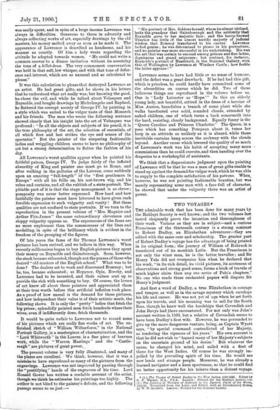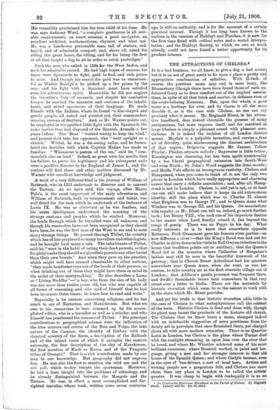TWO VOY.A,GES.* TEE admirable work that has been dime for
many years by the Hakluyt Society is well known; and the two volumes last issued eloquently prove the intention and thoroughness of their work. Various as they are in subject—and a curious Franciscan of the thirteenth century is a strong contrast to Robert Dudley, an Elizabethan adventurer—they are edited with the same care and scholarship. The greater part of Robert Dudley's voyage has the advantage of being printed in its original form; the journey of William of Rubruck is translated out of its monkish Latin. But the Franciscan is not only the wiser man, he is the better traveller ; and Sir Henry Yule did not overpraise him when he declared that his work, "in its rich detail, its vivid pictures, its acuteness of observations and strong good sense, forms a book of travels of much higher claim than any one aeries of .Polo's chapters." No one who reads these enchanted papers will dispute Sir Henry's judgment.
And first a word of Dudley, a true Elizabethan in courage and temper, as well as in the savage mystery which envelops his life and career. He was not yet of age when he set forth upon his travels, and his meaning was to sail for the South Seas, though he knew well the hardships that Cavendish and John Davys had there encountered. For not only was John's account written in 1593, but a relative of Cavendish seems to have been Dudley's first wife. However, he was persuaded to give up the more dangerous venture, being, as Captain Wyatt says, "by special command contradicted of her Majesty, as tendering the ripeness of his years." His own account is that he did not wish to" hazard many of her Majesty's subjects on the uncertain ground of his desire." But whatever the cause, he changed his mind, and sailed with a fleet of three for the West Indies. Of course he was strongly im- pelled by the prevailing spirit of his time. He would see new lands and strange people. Moreover, he was already a learned navigator and a keen sportsman, so that he could find no better opportunity for. his talents than a distant voyage.
• (1.) The Voyage Of Robert Dudley to the West Indies, 1594-1595. Edited by G. F. Warner, M.A., F.S.A. London: .Printed for the ,Hakluyt (2.) The Journey of William. of Rubruek to the Eastern Parts of the World, 125345. Translated from the Latin, and Edited, with an Introductory Notice, by W. W. Rockhill. London Printed for the Ilakluyt Society.
His versatility proclaimed him the true child of his time. He was, says Anthony Wood, "a complete gentleman in all suit- able employments, an exact seaman, a good navigator, an excellent architect, mathematician, chymist, and what not. He was a handsome personable man, tall of stature, red- hair'd, and of admirable comport, and, above all, noted for riding the great horse, for tilting, and for his being the first of all that taught a dog to sit in order to catch partridges."
Such the man who sailed in 1594 for the West Indies, and such his admirable record. He had high hopes of success, for there were Spaniards to fight, gold to find, and rich prizes to seize. And though his search for gold was as unsuccess- ful as Walter Raleigh's, he picked up a few prizes by the way, and his fight with a Spaniard must have satisfied even his adventurous spirit. Meanwhile, he did not neglect the traveller's duty of research, and despite his combative temper he marked the manners and customs of the inhabi- tants, and noted specimens of their language. He made friends with the Indians, whom he found "a fine-shaped and gentle people, all naked and painted red, their commanders wearing crowns of feathers." And, as Mr. Warner points out, he employed in his spirited little fight with the Spaniards the same tactics that had disposed of the Spanish Armada a few years before. The 'Bear' "worked warely to keep the wind," and poured shot into her opponent, who "went upright as a church." Withal, he was a far-seeing sailor, and he formu- lated the doctrine with which Captain Mahan has made us familiar. "Whosoever is patron of the sea," said he, " com- mandeth also on land." Indeed, so great were his merits, that his failure to prove his legitimacy and his subsequent exile were a positive disaster to the England of James I., and the curious will find these and other matters discussed by Mr. Warner with excellent knowledge and judgment.
A work of a very different kind is the journey of William of Rubruck, who in 1253 undertook to discover and to convert the Tartars. As we have said, this voyage, after Marco Polo's, is the most important of the early adventures, and William of Rubruck, both by temperament and talent, was well fitted for the task which he undertook at the instance of Louis IX. He was as observant as he was fearless, and his acute intelligence understood- the meaning of the strange customs and peoples which he studied. Moreover, the lands through which he travelled were all unknown, and though his researches have not been recognised as they should have been, he was the first man of the West to see and to note many strange things. He passed through Thibet, the country which has of late perplexed so many travellers and ethnologists, and he brought back many a tale. The inhabitants of Thibet, said he," were in the habit of eating their dead parents, so that for piety's sake they should not give their parents any other burial than their own bowels." And when they gave up the practice, which might well have seemed abominable to other nations, "they made handsome cups out of the heads of their parents, so when drinking out of them they might have them in mind in the midst of their merrymaking." He also describes a Lama or "Living Buddha"—" a boy, who from the size of his body was not more than twelve years old, but who was capable of all forms of reasoning, and who said of himself that he had been incarnate three times; he knew how to read and write."
Especially is he curious concerning religions, and he has much to say of Nestorism and Manichteism. But what we owe to his researches is best summed up by his accom- plished editor, who is a traveller as well as a scholar, and who himself has penetrated the recesses of Thibet. "His principal contributions to geographical science were the indication of the true sources and course of the Don and Volga, the lake nature of the Caspian, the identity of Cathay with the classical country of the Seres, a description of the Balkash and of the inland basin of which it occupies the eastern extremity, the first description of the city of Karakorum, the first mention of Kaoli or Korea, and of the Tungusic tribes of Orengai." That is a rich contribution made by one man to our knowledge. But geography did not engross him. He was also the first to mention the wild ass and the' ovis poli, which to-day tempts the sportsman. Moreover, he had a keen insight into the problems of ethnology, and he already distinguished between the Mongols and the Tartars. He was, in effect, a most accomplished and far- sighted traveller, whose book, written some seven centuries
ago, is still an authority, and is for the moment of a certain practical interest. Though it has long been known to the curious in the versions of Hakluyt and Ptuel2as, it is now for the first time fitted with critical notes and a sound interpre- tation; and the Hakluyt Society, to which we owe so much already, could not have found a better opportunity for its prudent labours.



































 Previous page
Previous page